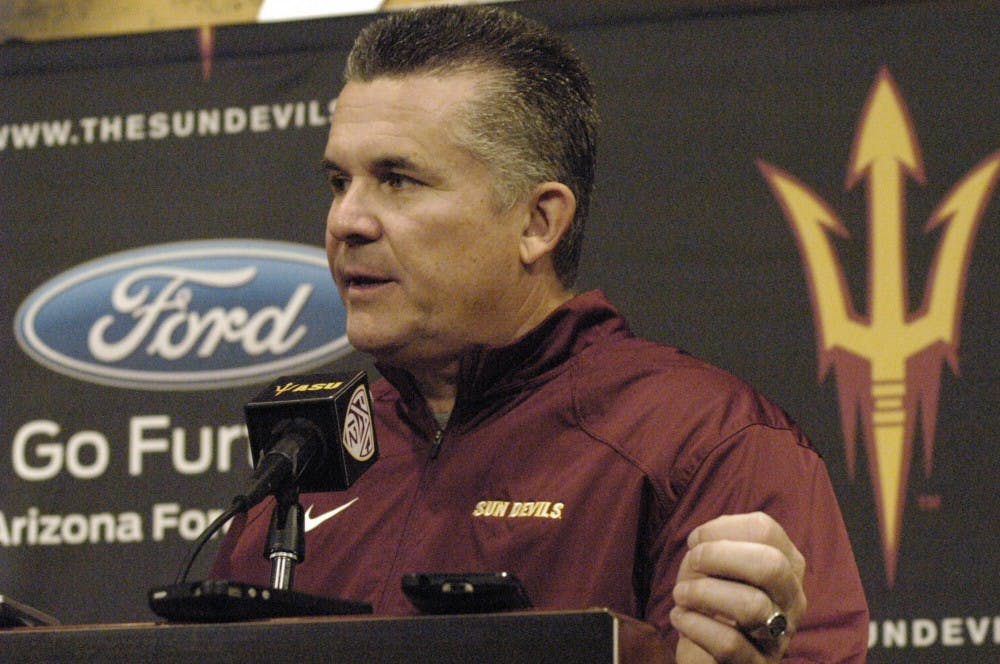 All hands are represented by the one hand in the Project Humanities logo.
All hands are represented by the one hand in the Project Humanities logo.Photo by Mackenzie McCreary
A hand reaches toward the sky, a hand built of individuals of different races, genders and religions, all unified into one hand that is open to possibility but closed to criticism.
“In all things that are purely social we can be as separate as the fingers, yet one as the hand in all things essential to mutual progress,” says Neal Lester, director of Project Humanities, as he quotes Booker T. Washington’s opinion of humanities and a bigger world than one’s surroundings.
Project Humanities, a university wide initiative at ASU, brings people together to talk, listen and connect. Launched in February of 2010, for the last two years Project Humanities has dove into issues of truth, definition and culture.
Project Humanities hopes to raise awareness of the commonalities between students and citizens regardless of their major, age, race or religion, says Lester, who is also the associate vice president for Humanities in the College of Liberal Arts and Sciences and an English professor.
“It’s about being a part of the humanities, this bigger thing,” says Patrick Reid, project assistant for Project Humanities and postsecondary education graduate student. “It brings lots of people together with shared interests and a shared understanding ... that it’s part of our everyday lives.”
While Project Humanities gears itself towards faculty, staff, students and alumni, it also reaches the neighboring communities of ASU.
Students can involve themselves in Project Humanities with The Student Group, an ASU club oriented toward bringing humanities to campus. Last year they hosted the event "Humanities Through the Senses," taking a look at the way humanities are a part of people’s everyday lives and how humans are connected through the five senses.
“It’s a really great resource and a really great way to connect students with stuff they might not know they were interested in or not know that was available to them,” says Jasmine Lester, who graduated Spring 2012 with a degree in psychology. As the daughter of Neal Lester, she has been an active member in The Student Group and Project Humanities since February 2012.
The Student Group is just another way for Project Humanities to connect students with their university; it creates an open environment for students to discuss their thoughts outside of the classroom says Jon Pabillaran, a Women and Gender Studies major and an active member in The Student Group.
“For me it provides a space for us to talk freely about race, gender and class and how it affects people,” Pabillaran says.
When people begin to talk about humanities and realize that every day is an opportunity to be humane, it can simplify their lives. By analyzing behavior and the way people communicate, situations can be clarified and commonalities between people can be discovered.
“It also says how we need to pay attention to [the humanities], and that you can’t really do all the other great stuff if you don’t pay attention to the way you communicate with people or interact,” Jasmine says.
 This semester Project Humanities is exploring the theme, "Are We Losing our Humanity?"
This semester Project Humanities is exploring the theme, "Are We Losing our Humanity?"Photo by Mackenzie McCreary
When Project Humanities officially started, it centered around a weeklong discussion about a particular theme in humanities. Every semester Project Humanities continues the tradition, and this semester the initiative will spend six days on and off campus exploring the theme “Are We Losing our Humanity?” Through a series of films, speakers and discussions Project Humanities questioned if the strong presence of technology in people’s lives is affecting their humanity.
“Through all of these different social medias and technologies are we losing our humanity? Are we losing our sense of civility? Are we losing trust? Are we losing the ability to value integrity? Or are we all just frantically racing to the next thing to get ahead?” says Neal.
Project Humanities worked towards answering those questions posed by Neal for six days starting on Sunday, Sept. 10. He says the questions do not oppose technology, but instead look at the individual as a companion to technology and science.
“Humanities is like air. It’s around us, we sometimes may see it but we don’t really see it. We see its effects, but we start missing it when we start suffocating,” says Neal. “Just like you need air to breath, you need humanities to exist and to coexist because we all exist not in a vacuum but in a community.”
Contact the writer at k.etzel@asu.edu




